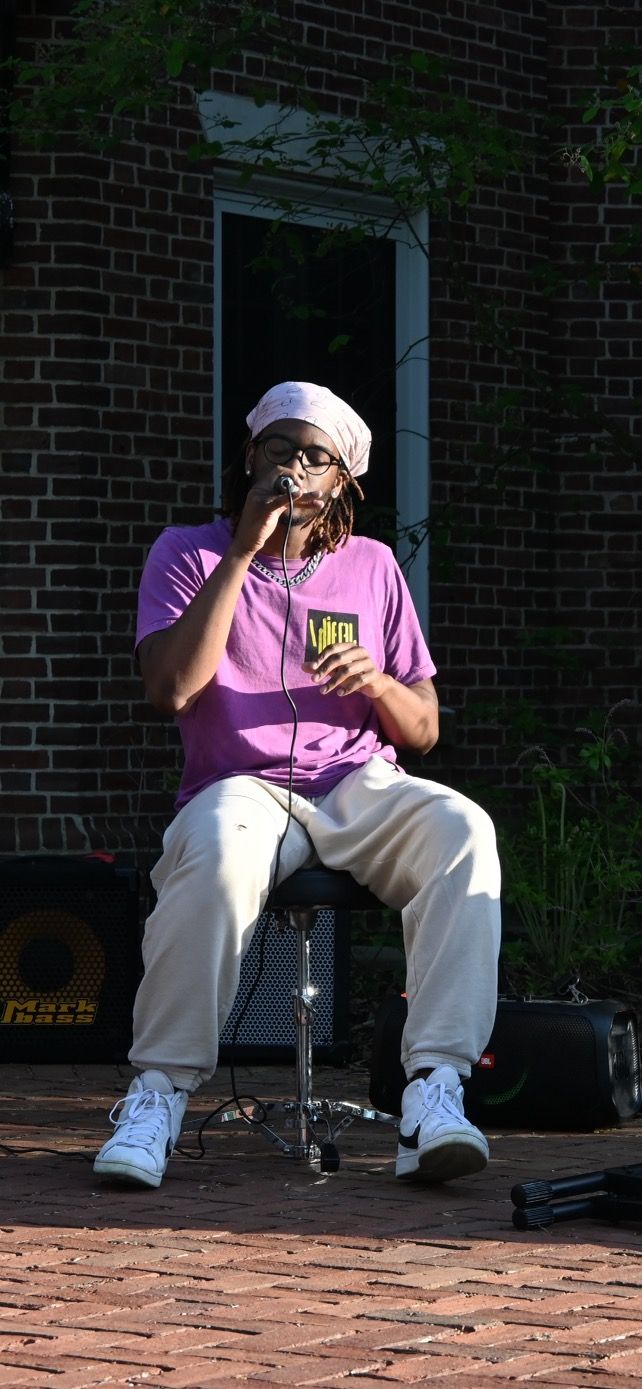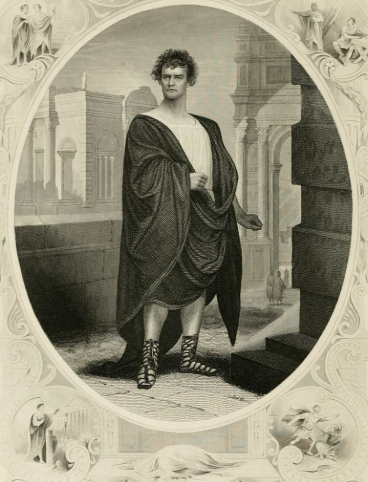Context, Creation, Come-Up: Stanley Jackson ’25
Stanley Jackson ’25 began creating music while at Amherst, but its presence in his life extends back much further.

“It’s my comeback now,” declares Stanley Jackson ’25 in this edition of 3Cs. I sat down with Jackson to learn the Context of his days dancing in church, the Creation of his musical identity, and what’s on the Come Up as he prepares to release music with fellow Amherst talents.
The last name “King Jackson” can’t help but draw attention but the musician exudes a humility and candidness that is well represented by his stage name, S.I.K. Jackson. The initialism is reminiscent of an author’s name. This is no accident. “I was going to use S.I.K. Jackson as my pen name,” Jackson recalled. The first words he put to paper were stories, not raps. Noting that he has “always had a book in hand or some sort of story,” Jackson has always gravitated towards wordcraft. It is shocking, then, that it took him 17 years to pen a rhyme and deliver it.
Writing gave Jackson an outlet for creative storytelling, something that later translated to the narratives of his raps. Jackson was a frequent and avid writer. He would craft short stories and explore rhythms, sounds, and structure. Before it became a musical expression, Jackson’s writing was his means of creativity. “I had a love-hate relationship with [poetry] for a while but at some point I just got it — it’s like the rhythm of the words that’s beautiful to me,” he said. For his Common App essay, Jackson wrote a short horror story that piqued the interest of the WashU English department. In hindsight, we can see these years of increasingly bold and provocative writing as a precursor to Jackson’s unique approach to rapping and the world of hip-hop.
Jackson was never isolated from the world of music. As a child he participated in an African drumming troupe, and would lend his voice to his local church. However, he added that “the most musically involved thing [he] was doing was dancing.” Jackson recounted stories of his journey from Mobile, Alabama, his birthplace, to Jackson, Mississippi, until finally stopping and living in southside Atlanta, where he’s been since. In Mississippi, Jackson finally settled down and participated in different dance programs. During the summer, he participated in programs like the Alvin Ailey Dance camp to learn styles from ballet to jazz. In church, he participated in a dance ministry group where he worked with pieces choreographed by the group’s founder, Jason. Jackson considered Jason a big brother figure, and through Jason accessed opportunities like the Disney Dreamer Academy.
Jackson recounted his experience with the ministry as “one of those wild parts of [his] life,” brushing over the fact that Jason is Jason Harvey, television host Steve Harvey’s son. Jackson made the connection through his grandmother, who tutored Jason in math. Grandma Jackson was involved heavily with the church and ergo with Jackson’s upbringing, often encouraging him to use the many talents he had cultivated. “My grandma had always said when I was younger … ‘You gotta start singing, you either use it or you lose it,’” he told me. For a long time Jackson did not heed this advice; he was too busy with football and dancing.
After graduating high school, Jackson started to reevaluate how he spent his time. “I was done … I don’t want to play football anymore … and I was coming to Amherst, so I’m not going to be dancing either. Let me sing some songs,” he said. The budding musician recorded a cover of a Daniel Caesar song and posted it to Instagram, to a positive reception. Yet, he was not satisfied. The “switch,” as he puts it, was quite sudden. “I was taking a nap on my couch,” he told me. “I woke up and I just had bars in my head.” Jackson recorded the song and published it to social media. He was very pleased with the reaction. With a growing confidence in his own abilities and the whole world before him, he was ready for Amherst.
“Amherst is closely tied to me starting,” he said. “I had recorded my first song here in the basement of James and Stearns on a Blue Snowball with no pop filter.” He used the school’s studio to record his first mixtape, something he’s been considering returning to on streaming services. The previous passion for writing evolved naturally into writing poetry and raps that never saw the light of day. He used beats from a childhood friend, Charles. Another longtime friend, Tahje, was a rapper who had encouraged Jackson’s development, inspiring him to take music more seriously. Jackson had backing from his friends, experience from his past writing, singing, and dancing, and now that he was at Amherst, he had the motivation to create. It was at Amherst that Jackson performed his first song, an untitled track written specifically for the Black Student Union’s 2018 annual Harlem Renaissance.
It wasn’t until the 2021 Black Art Matters festival that Jackson performed live again. Between the two events, he took a hiatus, which began as “a semester off, then that semester turned into two years.” Jackson did not take a break from music, fortunately. At Black Art Matters, he debuted his song “Sikker Than You” which he wrote during his two-year break when he was sick with Covid. “The first thing I do on that song is cough my lungs out,” he laughed. Those two years passed by meaningfully. He enrolled at Georgia State to continue taking classes “and keep [his] mind sharp.” He was unsure about returning to Amherst but felt dissatisfied with his routine. He continued writing and practicing his craft. In time, Jackson decided to return to Amherst and ultimately gained the invaluable connections that have placed him musically where he is today.
Reflecting on his current musical process, Jackson describes it as “getting a beat and then just writing,” adding: “I like to start with a physical pen and pad because my mind loads easier when it’s something I can touch.” Jackson collaborates frequently with other artists on campus, including previous 3Cs interviewees such as Gregory R. Smith III ’25E, Kiiren Aamer ’24, and Free Diallo ’26. He works especially closely with Smith, and they can often be found together “sitting there playing music. [Smith] will be on his guitar, [they’ll] be jamming out.” Jackson does admit they don’t get around to recording much, given the free-flowing nature of their musical relationship. Smith’s particular style seems to draw out some of Jackson’s musical inspirations, especially his gospel background from his days at church in Atlanta. With others, like Aamer, Jackson’s approach to music is akin to a “steel sharpens steel” mindset. Jackson recalled the creation of Aamer’s debut album, “The Carter Side/The Jackson Side,” telling me, “We met up, I dropped my verse. I left. I remember he re-recorded his verse because he was like, ‘Fuck you.’”
“I feel like I got a community of people I can go to if I need a feature, if I want to go bar- for-bar with somebody, if I want to sing on somebody’s song, or if I want to play a show,” he said. “We can do stuff. I feel like I got some support.” Jackson feels lifted by the musical community here at Amherst. He reflected on the evolution of his style, which has been heavily inspired by the people he’s met and worked with. More than ever before in his musical journey, Jackson is inspired to create and to release.
Jackson is confident he knows what’s to come for his music in the near future: “First off, I’m putting my old shit back on SoundCloud,” he said. Currently, Jackson’s SoundCloud is sparsely populated, but he seems sure this won’t be the case for long, explaining, “I got stuff I’m writing right now to release with Free and Kiiren … I have some more shit with Kiiren and some stuff with Greg that’s recorded and needs to be mixed and dropped.” Jackson revealed an upcoming project in collaboration with Smith called “SIK Three Times,” with a song off the project, “Kirko Bangz,” having already been performed on campus.
“Really, it’s my comeback now,” Jackson affirmed. He is putting together solo material, is featuring heavily on other artists’ work, and is ready to promote his work and his presence on campus. Jackson expressed his pleasure in working with Isa Tariq ’25 and events hosted by AC Major Productions, a student collective promoting music and community on campus. Jackson performed at one of Major Productions’s events in Drew House, and expressed a continued desire to perform at future functions. Back home, Jackson wants to establish himself within the Atlanta rap scene. He sets that as a “medium-term” goal when he can be more present back home and have more music released, but he seemed eager.
Jackson has hidden hours upon hours of musical talent behind unlisted links and one-time performances, but now that he is musically coming into his own, he is ready to release a flood of music that culminates his tireless work as an artist. The confluence of his dance, his singing, his background, is right on the horizon. Jackson intends to release music in the next few months. To keep up with his future endeavors, follow him on Instagram or Twitter @sikmatic, SoundCloud as “S.I.K. Jackson,” and on YouTube as “s.i.k. jackson”.
Amherst is where Jackson credits his start as a rapper, and his peers inspire his development every day. He has a few names in particular that he wanted to highlight as valuable to him. He wants to thank the N.O. Collective, Gregory R. Smith III ’25E, Kiiren Aamer ’24, Freeman Diallo ’25, and PJ Smith ’25 and College Park, Georgia. In Jackson’s own words, “Stay SIK.”




Comments ()